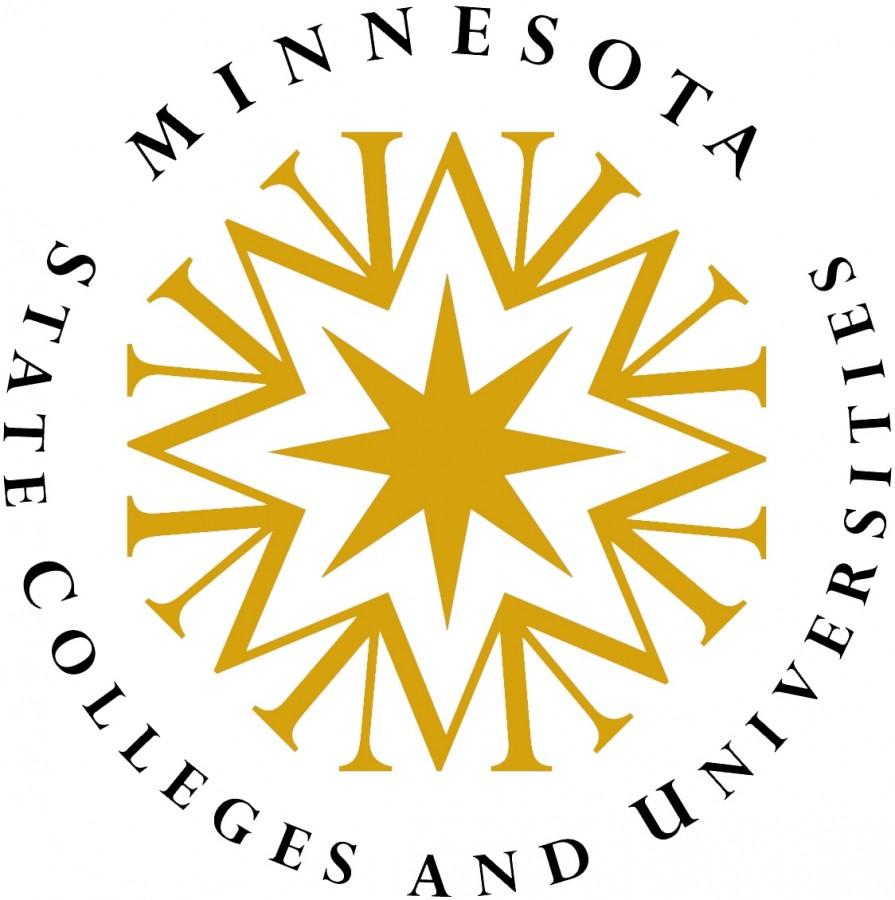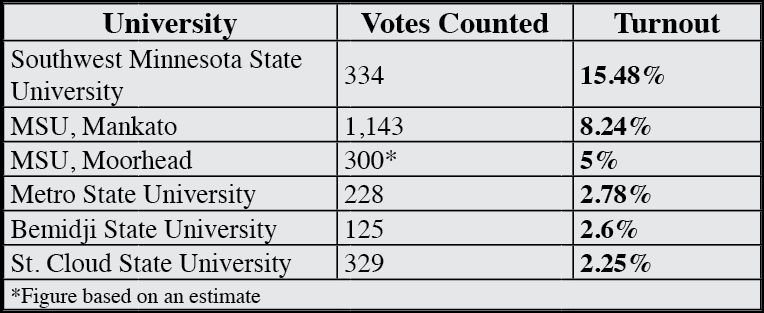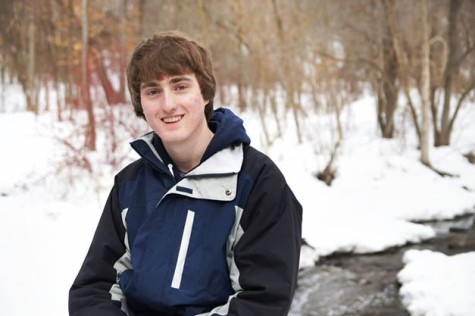Student Election Voter Turnout a Systemwide Problem for MnSCU
Three universities fell severely below the national average
November 12, 2015
Only a small number of students determine the outcomes of student government elections across Minnesota State Colleges and Universities’ (MnSCU) 4-year colleges.
That is according to spring election data gathered from each of MnSCU’s universities. They are Bemidji State University, Metropolitan State University, MSU Mankato, MSU Moorhead, Southwest Minnesota State University, and St. Cloud State University.
Winona State University’s student government failed to provide the Spur with their spring election data.
The national average for student election voting turnout is between 10 and 15 percent, according to the American Student Government Association.
Five of the six responding universities fall below, or severely below the average.
Moorhead recorded that 5 percent (300 votes) of their students participated in their spring election. This number is based on rounded figures.
Three universities saw a voter turnout of less than 3 percent, or around five times below the national average. Metro State saw 2.78 percent (228 votes) in their spring election.
“The vote totals were about average for us,” Philip Fuehrer, Interim Director of Student Development at Metro State said.
Bemidji reported a 2.6 percent turnout (125 votes), while SCSU had just 2.25 percent (329 votes). That is the lowest in all of MnSCU’s 4-year universities.
“This is the lowest voting turnout we have ever had,” Summer Vogl, SCSU Student Government President said. “We do fall elections also, which had about 450 voters. This year we are only doing one election in the spring to hopefully get more voting in the one election.”
SMSU had the highest spring voting turnout at 15.48 percent (334 votes), while Mankato had the next highest with 8.24 percent (1143 votes).
The low percentages of students voting for student representatives means only a few are deciding how their schools should be governed.
“It is important that the entire student body has a say in who is chosen to represent them,” Ashanti Payne, SMSU Student Government President said.
Student governments approve constitutions for clubs and organizations, and has the power to determine their funding. They also can make recommendations for the allocation of student funds.
Last year, student governments across the seven universities debated Charting the Future, a highly contested plan to revamp the MnSCU system. Several student governments passed votes of “no confidence” in the plan, including Bemidji, Metro State, and SMSU.
“The main reason it is important to vote is as a student senate, it is our job to represent the interests of our student body,” Shane Vogt, SMSU Student Senator said. “If students do not vote, then the voice of the students may not actually be representative.”
SMSU’s rising turnout
SMSU had the highest voter turnout of the MnSCU universities.
Student government officials attribute this to their new voting system, which they say has improved voter turnout.
Before, students would have to go to the SMSU website to vote. With the new process, all 2,157 eligible voters received ballots in their student email.
Though voter turnout at SMSU is higher than MnSCU’s average, there is still room for improvement. Student government officials recognize more can be done to increase participation.
“Overall, even the 334 voter turnout, while it is an improvement, is still too low,” Vogt said. “I think that it is too small of a percentage of students that vote.”
Christopher Ross, SMSU Judicial Board Coordinator, organizes the elections.
“We can always do more to improve turnout,” Ross said. “I do believe that [turnout] will continue to rise with this new system, and it seems like this year’s freshman are very involved.”
SMSU holds elections at the end of each semester. The next election will take place Dec. 1-3.
Eight current senator’s terms are ending at the end of the semester, and are up for re-election.
A special election was held earlier this fall due to four open seats on the senate. McKenzie Besel, Krishna Ghimire, Courtney Lundy, and Makenzie Moes were appointed in October.
Ghimire and Lundy turned in applications, while Besel and Moes were write-in candidates.
In the special election, 139 votes were cast as opposed to 334 in the spring. Vogt says this is normal for a special election because less campaigning is done.
SMSU student government officials remain hopeful the rising turnout will continue to buck the trend of low turnout across MnSCU universities.
“Through improvements to the election process, we have already improved the voter turnout tremendously,” Vogt said. “I believe this trend of improvement will continue through our upcoming elections.”




